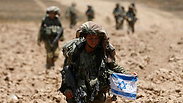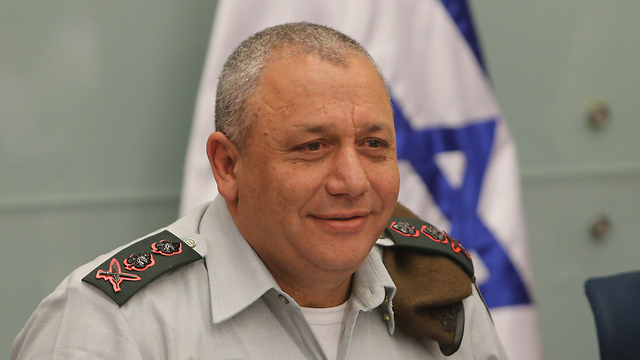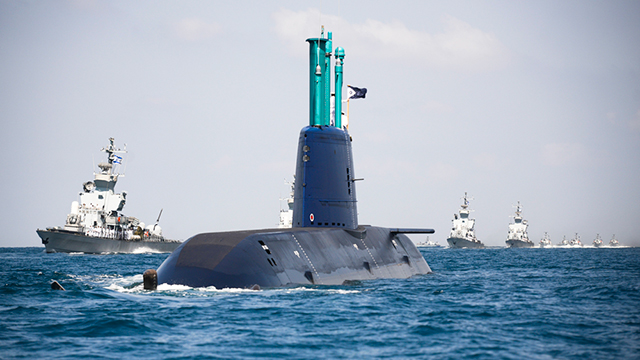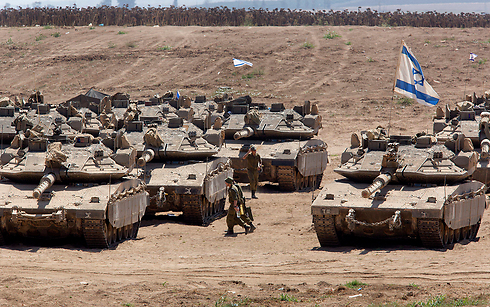
IDF's five-year plan to focus on strategic supplies
Israel's military is learning the lesson from Gaza conflicts which left its stocks depleted. IDF chief Eisenkot has instructed that a larger portion of the budget be allocated to acquiring supplies.
The IDF is planning a considerable increase of supplies for combat operations in 2016, including ammunition, fuel, food, replacement parts, and more. This is a very important development, since it should allow the military to operate without being dependent on supplies from outside sources, and to conduct combat operations on several fronts, for longer than it ever has before.
This is one of the lessons learned from the Gaza conflicts in recent years, some of which have lasted between 30 and 50 days, leaving the IDF with depleted stocks in critical areas, specifically aerial munitions. The increase is also part of an IDF contingency plan in case of an intensive conflict with Hezbollah on the northern front.
A conference of senior IDF commanders (colonels and above) convened this week, including, unusually, battalion commanders from all branches of the military. During the conference, IDF Chief of Staff Gadi Eisenkot clarified that military operations during the current wave of violence in the West Bank will not affect the readiness of combat units on Israel's main front – the Lebanon border.

According to Eisenkot, the IDF will not repeat its past mistake of sending to Lebanon troops fatigued by routine combat operations in the Palestinian territories.
The IDF leadership was presented on Monday with its new five-year work plan, codenamed Gideon, which is expected to be approved by the Security Cabinet this month. As part of this plan, the IDF chief has instructed that most of the military's budget for purchases in 2016 is allocated towards war readiness. This means a supplementation and increase of replacement parts, munitions, and fuel stocks.
These new priorities come at the expense of new weapons projects. Every year, the IDF, through the Ministry of Defense, purchases military equipment and invests in new projects to the tune of about NIS 8-9 billion. This year, most of that sum will go to filling the stocks.
The IDF will take in a long line of new weapons this year, such as its fifth submarine and the new F-35 fighter jets that are expected to arrive in December of 2016.
The IDF decided to pass up on the purchase of a sixth submarine from Germany, with a senior officer saying Wednesday the Navy will base its submarines fleet on only five vessels. However, a decision to cancel the purchase of the sixth submarine requires the approval of the political echelon.
Israel recently received the INS Tannin, and Navy teams along with defense industry companies have been testing out new weapons, communications and intelligence systems that have been installed in the new submarine after it arrived from Germany last summer. The fifth submarine, the INS Rahav, which is identical to the INS Tannin, is scheduled to arrive in the coming months. A sixth submarine is scheduled for delivery in 2019.
In addition, the "compensation wishlist" Israeli officials presented to the American government includes new weapons systems like V-22 planes, advanced fueling aircraft, another squadron of stealth fighters, and weapons such as missiles and smart bombs.
As the IDF chief sees it, the military should spend the next year learning to implement these new acquisitions, before embarking on new projects.
One of the main topics of discussion on Monday's conference was the changes that the GOC Army Headquarters will be going through during 2016. All of the budget allocations toward purchasing and maintenance of Army assets will be transferred from the IDF's Technology and Logistics Branch (TLB) to the Army.
This step transfers power from the General Staff over to the Army, making it a more dominant part of the military as a whole. The Army will have independence in managing its own purchases, without depending on the General Staff. This will shorten the process and set internal budgetary priorities for each branch of the military. Additionally, merging the Army with the TLB will save the IDF some NIS 1 billion.
The TLB will remain the IDF's logistical command, in charge of strategic supplies – large munitions centers, food and fuel centers – during routine operations, and will also be responsible for supplying the front lines during emergencies.
The five-year plan will also allow every branch in the military to manage its own manpower, in a flexible manner. In that way, for example, the head of Military Intelligence could decide to trade a lieutenant colonel with three majors in order to save money and invest it in cyber intelligence instead. Additionally, the plan calls to cut 11 percent of the senior officers in the IDF headquarters. Two brigadier generals, 24 colonels and 80 lieutenant colonels will all be cut by the summer of 2016.
According to the plans presented on Monday, the sums that will be freed by cutting down on home front bases will be allocated to increasing combat capabilities. This means that starting in 2016, an IDF combat division will be able to increase its fighting time by a significant margin. It might become critical during combat operations in places with hard-to-cross terrain, such as Lebanon.
While the nuclear deal signed between Iran and world powers did have an effect on the IDF's five-year work plan, most of the focus was placed on Israel's neighbors.
"Hezbollah's precise weapons did not just emerge out of nothing. We haven't invested a single shekel on the Iranian issue - something that deals with third-tier threats - instead we invested in generic arms for all fronts," the IDF official said.
Yoav Zitun contributed to this story.












